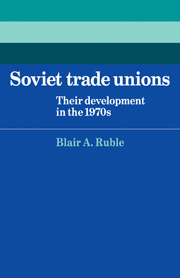Book contents
- Frontmatter
- Contents
- List of tables and figures
- Acknowledgments
- Abbreviations
- Introduction
- 1 Soviet trade union development: 1917–1956
- 2 Soviet trade union development: 1957–1980
- 3 Union–management–Party relations at the plant
- 4 The legal and social rights of Soviet workers
- 5 Do workers participate in Soviet management?
- 6 Patterns of union behavior
- 7 The international activities of Soviet trade unions
- Conclusion
- Notes
- Classified bibliography
- Index
4 - The legal and social rights of Soviet workers
Published online by Cambridge University Press: 07 October 2011
- Frontmatter
- Contents
- List of tables and figures
- Acknowledgments
- Abbreviations
- Introduction
- 1 Soviet trade union development: 1917–1956
- 2 Soviet trade union development: 1957–1980
- 3 Union–management–Party relations at the plant
- 4 The legal and social rights of Soviet workers
- 5 Do workers participate in Soviet management?
- 6 Patterns of union behavior
- 7 The international activities of Soviet trade unions
- Conclusion
- Notes
- Classified bibliography
- Index
Summary
The discussion at the beginning of this book stressed the growing importance of the legal and social rights of workers to Soviet union organizations. Yet the lack of a precise definition of those rights has caused continuing conflict both within the unions themselves and between union and management. Some factory officials view increased productivity as the sole aim of plant operations, whereas others acknowledge broader issues of worker welfare. The degree to which union officials are able to protect their membership from managerial “bureaucratism” frequently hinges on such definitional conflict, as the story of Valerii Vecherenko illustrates.
A little more than ten years ago, Valerii Vecherenko joined a construction team near Norilsk. During a 1976 trade union meeting, he rose to speak out against the poor working and living conditions at various work sites operated by the Moscow Gas Line Construction Association. Much to his surprise, the hall exploded in applause, and within a few months Vecherenko found himself serving as the chairman of his construction unit's trade union committee.
As union chairman, he decided to tour every construction site within his jurisdiction and discovered, to his dismay, that management frequently violated safety regulations. Vecherenko took his evidence of legal transgressions directly to the supervisors involved, including Aleksandr Grigorevich Shcherbukha of the Building and Assembly Administration. The supervisors steadfastly refused to correct any of the violations.
- Type
- Chapter
- Information
- Soviet Trade UnionsTheir Development in the 1970s, pp. 64 - 89Publisher: Cambridge University PressPrint publication year: 1981

